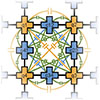| Feb 06, 2025 |
|
(Nanowerk News) Physicists have built a new type of digital-analogue quantum simulator in Google’s laboratory, which can be used to study physical processes with unprecedented precision and flexibility. Two physicists from PSI’s Center for Scientific Computing, Theory and Data, played a key role in this achievement.
|
|
How does cold milk disperse when it is dripped into hot coffee? Even the fastest supercomputers are unable to perform the necessary calculations with high precision because the underlying quantum physical processes are extremely complex. In 1982, Nobel Prize-winning physicist Richard Feynman suggested that, instead of using conventional computers, such questions are better solved using a quantum computer which can simulate the quantum physical processes efficiently – a quantum simulator. With the rapid progress now being made in the development of quantum computers, Feynman’s vision could soon become a reality.
|
|
Together with researchers from Google and universities in five countries, Andreas Läuchli and Andreas Elben, two theoretical physicists at PSI, have built and successfully tested a new type of digital-analogue quantum simulator. This represents a milestone because their simulator calculates physical processes not only with unprecedented precision; their concept is also particularly flexible, meaning that it can be applied to many different problems – from solid-state physics to astrophysics.
|
|
Their findings were published today in the scientific journal Nature (“Thermalization and criticality on an analogue–digital quantum simulator”).
|
Combining analogue and digital
|
|
A key aspect of the new quantum processor is that the 69 superconducting quantum bits (qubits) on the quantum chip developed by Google permit both digital and analogue operating modes. Digital quantum computers perform their operations using universal quantum gates, similar to the logic gates in classical computers. The difference is that, thanks to quantum mechanical superposition, qubits can not only assume the states 0 and 1 but also a multitude of intermediate states.
|
|
Although such purely digital quantum computers are already very powerful, their potential as quantum simulators is still limited. Analogue quantum simulators, on the other hand, rely on the direct simulation of physical processes, realistically modelling the interactions between the different particles, for example to study magnetic properties in solids. These two approaches – digital and analogue – have now been successfully combined for the first time in an experiment that brings together the strengths of both worlds.
|
|
To do this, the physicists define discrete initial conditions, such as introducing heat into a solid – this is the digital mode. This allows the starting conditions to be defined precisely and flexibly. In the coffee-cup analogy, for example, this would be a milk jug pouring drops of milk in a specified and controlled manner in a hundred different places, all at the same time. The subsequent process by which the milk spreads out in the coffee corresponds to the analogue mode. The interaction between the qubits simulates the physical dynamics, such as heat propagation or the formation of magnetic domains, as they occur in real solids.
|
|
“We can watch the quantum simulator as it reaches thermal equilibrium – or in the coffee analogy: the milk is distributed in the coffee and the temperature is equalised in the process,” says Andreas Elben, a tenure-track scientist at PSI. “Our research demonstrates that it is possible to create superconducting analogue-digital quantum processors on a chip and that these are suitable as quantum simulators,” Andreas Läuchli points out.
|
Heading towards a universal quantum simulator
|
|
However, thermalisation – the process of reaching thermal equilibrium – is just one of many exciting questions that can be answered using the new quantum simulator. The concept demonstrated here paves the way for a universal quantum simulator and is to be used in a wide range of different areas of physics. It extends beyond the capabilities of existing analogue quantum simulators, each of which is only suitable for a specific physical problem.
|
|
One topic that can be studied in this way is magnetism, Läuchli’s speciality. The qubits in Google’s quantum chip are arranged in the shape of a rectangle, and in the initial state the directions of their magnetic fields alternate strictly. But what happens if the chip is triangular? This could disrupt the tidy arrangement because the qubits are unable to adjust their magnetic orientation in the regular pattern they naturally adopt. This phenomenon is known as frustrated magnetism and is of interest, for example, in connection with computer chips that switch and store bits based not on the charge of the electrons but on their magnetic spins. This leads to a much higher memory density and a higher computational speed.
|
|
Further applications are opening up in the development of new materials, such as high-temperature superconductors, and even medicines that can be used more precisely and cause fewer side effects. Quantum simulators are even in demand in astrophysics. One example is the so-called information paradox, which states that no information may be lost in quantum physics. However, astrophysicists believe that black holes do in fact destroy information about their formation – new types of quantum simulators might clarify the situation.
|
|
“Our quantum simulator opens the door to new research,” promises Andreas Läuchli. Although the project with Google has come to an end, many other physical questions await him and his team at PSI. At the Quantum Computing Hub of ETHZ and PSI and beyond, quantum computers and quantum simulators are being developed on various technological platforms, including trapped ions, superconducting qubits and Rydberg atoms. These systems will soon make it possible to study exciting questions posed by quantum physics at PSI.
|
|
Andreas Läuchli: “We also serve as a source of ideas for new experiments at PSI’s large research facilities. And we offer our support to researchers carrying out their experiments at the facilities when it comes to interpreting surprising results. And in the future we will increasingly be using quantum simulators for this purpose.”
|

